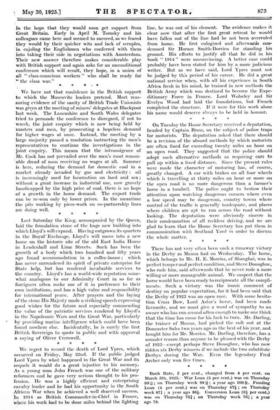We regret to record the death of Lord Ypres, which
occurred on Friday, May 22nd. If the public judged Lord Ypres by what happened in the Great War and its sequels it would do a great injustice to his memory. As a, young man John French was one of the military reformers and he gave very serious thought to his pro- fession. He was a highly efficient and enterprising cavalry leader and he had his opportunity in the South .Africrn War when he achieved a well deserved success. In 1914 as British Commander-in-Chief in France, where his work had to be done miles behind the fighting line, he was out of his element. The evidence makes it clear now that after the first great retreat he would have fallen out of the line had he not been overruled from home. He first eulogized and afterwards con- demned Sir Horace Smith-Dorrien for standing his ground. His efforts to justify .all that he did in his book " 1914 " were unconvincing. A better case could probably have been stated for him by a more judicious writer. But as we have said, Lord Ypres must not be judged by this period of his career. He did a great national service when, with all his experience in South Africa fresh in his mind, he trained in new methods the British Army which was destined to become the Expe- ditionary Force in France. Lord Wolseley and Sir Evelyn Wood had laid the foundations, but French completed the structure. If it were for this work alone his name would deserve always to be held in honour.










































 Previous page
Previous page